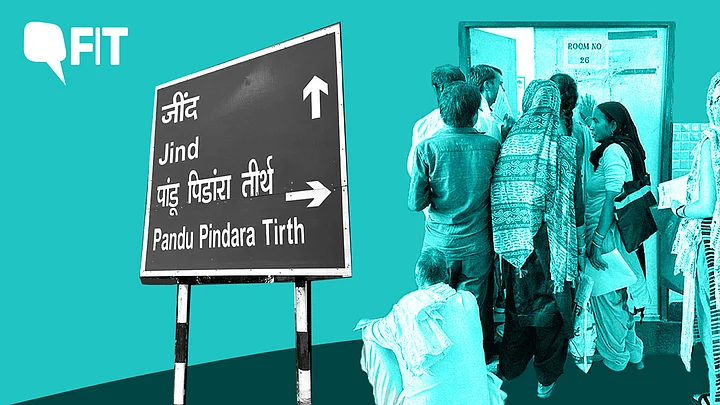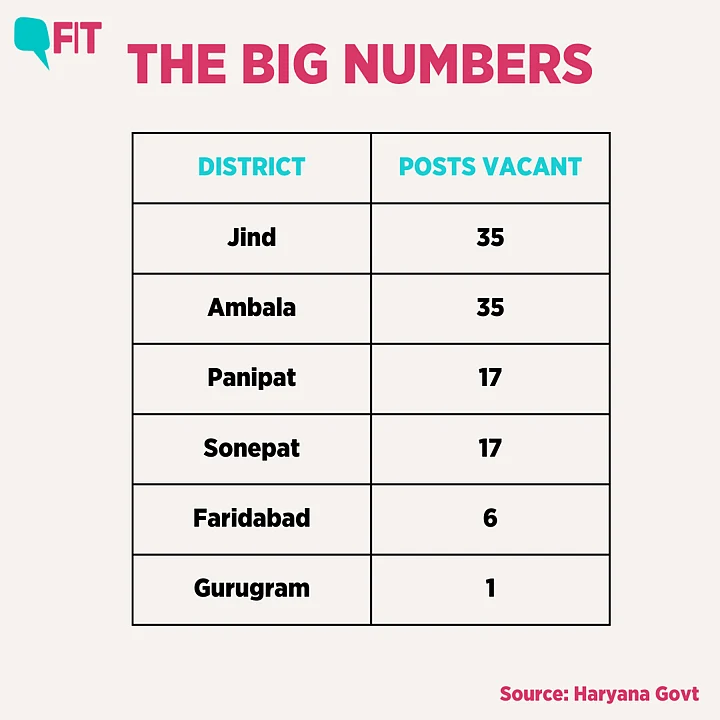For doctors at the Civil Hospital in Haryana's Jind, juggling hundreds of patients, a barrage of administrative work, and medico-legal cases has become a habitual task, thanks to an acute shortage of staff.
On the face of it, hiring more doctors would solve their problem. But they allege that the Haryana government has instead been rehiring retired doctors to meet their urgent demands.
"The Civil Surgeon Officer of Jind recently deputed four more doctors by transferring them here from other hospitals on a temporary basis," Dr Aman (name changed on request), a senior medical administrative officer at the Civil Hospital, told The Quint.
Sometimes, when the doctors need assistance, they even rope in Ayurveda medical officers from other healthcare centres, he added.
In Jind, one of the largest cities in Haryana, barely three hours away from both the state capital Chandigarh and the national capital New Delhi, there are at least 35 public healthcare facilities – most of them primary. The Civil Hospital is the biggest of them all.
On average, the hospital receives about 1,000-1,500 patients every day. Apart from this, at any point, close to 80-100 patients are admitted here.
These are patients who come from all across the district – from Dhamtan Sahib, Julana, Uchana, Narwana, Alewa, and Safidon. However, out of the required strength of 55, only 22 doctors are employed at the hospital at the moment.
In February this year, Haryana Health Minister Anil Vij told the state Assembly that 26 percent of posts of medical officers – 1,134 out of the 4,260 sanctioned positions – lie vacant in the state. He added that 144 seats for senior medical officers (out of 374 sanctioned posts) and 1,506 positions for doctors (out of 5,522 sanctioned posts) were also empty.
FIT visited the hospital and spoke to doctors and patients to understand how concerning this phenomenon is.
A Glaring Shortage of Doctors
At around 3 pm on 19 April, 21-year-old Manish hastily walked to the emergency ward at the Civil Hospital where his uncle was admitted to after he fell sick.
"My uncle suddenly fell ill today. We took him to the emergency ward about 1-1.5 hours ago. We were told he might need some operation and further consultation, but there's no surgeon in the hospital right now."Manish
The surgeon, who had already left for the day, would only return the next morning. There's no one else that patients like Manish can turn to in times of urgent need as there's only one surgeon employed in the hospital.
Dr Aman, who holds an administrative post and is responsible for overseeing the management, including paperwork, from 8 am to 2 pm daily (which are the official working hours of the hospital), told FIT that the shortage of doctors in the hospital is so acute that he must also consult patients while handling hospital work.
On average, every 10-15 minutes, the security personnel sitting outside Dr Aman's cabin knocks on the door and escorts a patient and their family inside.
Throughout the day, there are also multiple long queues of tens of people wanting to get their medical clearance forms signed by Dr Aman to be deemed fit for religious trips like the Amarnath Yatra.
He is also constantly occupied by other things – patients coming in and asking for medicines, doctors reaching out to him for advice, and looking at any medico-legal cases in the hospital, among others.
Overburdened with the additional workload, Dr Aman stays back after his shift on most days to complete his actual tasks.
"I usually come in by 8 am. But since there was a court summons today in a medico-legal case, I got late in reaching the hospital. After that, patients kept coming in. So, I haven't really been able to get my actual work started. This happens a lot when my workday gets extended, because during OPD [out-patient department] hours, I am always surrounded by patients."Dr Aman
This is the story of most doctors at the hospital.
With almost 1,000-1,500 patients seeking medical attention at the Civil Hospital daily, doctors often feel stuck between tending to the patients and getting tied up in other administrative responsibilities, which include (but are not limited to):
Bimonthly medical camps in prisons
Court summons in medico-legal cases
Specialist doctors deployed on VIP duty when eminent personalities visit
Moreover, the 24*7 functioning units of the hospital – the emergency, nursery, and gynaecology departments – have only four doctors each, as a result of which they struggle to run them smoothly.
Doctors alleged to FIT that they are not only overburdened but are also penalised for raising their concerns.
"Our demands have gone unheard for long now. Doctors of this hospital had gone on a two-day strike, a few months ago. Our salaries for those two days were blocked by the government, we still haven't received them."Dr Aman
FIT has written to the Health Ministry of Haryana asking what steps are being taken to fill the vacant positions. The story will be updated when we receive a response.
'Can't Give Quality Care to Patients'
Dr Vinita, a chest physician who has been working in the hospital for the last four years, is a specialist doctor often deployed for VIP duties.
In the hospital, she is often surrounded by patients on all sides. She handles the crowd with ease and is used to tending to multiple patients at once.
"We see hundreds of patients each day both in the OPD and the ward, often staying beyond our shifts just so that we can cater to everyone. But we don't have time to counsel them properly or ask a lot about their medical history since we barely get two minutes with each patient."Dr Vinita
This is what this reporter also saw while following around these doctors all day. With patients constantly around them, the doctors were not able to give more than a few minutes to anyone.
That often doesn't bode well with patients.
Dr Manjeet Dhiman is a Casualty Medical Officer. She joined the hospital a year and a half ago. Since her time there, patients' attendants have been rude to her more times than she expected.
She says, "At the emergency ward, we are the first point of contact, so misconduct from attendants and stress is quite common. It's also tough to handle since each shift has only one doctor working."
'No Separate Cadre': Retaining Specialist Doctors Is Tough in Haryana
But why is there such a huge shortage of doctors in Haryana?
According to the doctors, one of the major reasons is that the state doesn't have a specialist cadre for doctors.
According to the Union Ministry of Health and Family Welfare, a specialist cadre is "an institutionalised process and structure which enables separate and direct entry for postgraduate doctors."
This essentially means that MBBS doctors and specialist doctors have a near identical pay and work structure in Haryana, which is why doctors prefer to move out of government setups, more often than not.
At the Civil Hospital, there are only six specialist doctors – a surgeon, an orthopedician, a psychiatrist, a paediatrician, a physician, and a gynaecologist.
Incidentally, on the day that this reporter visited the hospital, it was the last working day of a child health specialist and a forensic expert.
Dr Anjali (name changed on request), the child health specialist, had quit in March after being associated with the hospital for almost 14 years to open her own private hospital in Jind.
"There are such few doctors that specialist doctors are forced to handle OPDs. There is a huge workload, and we don't get paid the way specialists should," she adds.
Dr Vinita echoes the same sentiment. Among other reasons, long shifts, no increments, no flexibility of leaves, and irregular leaves, have brought in a sense of frustration and fatigue.
"I had even resigned once, but then stayed back," she laughs as she tries to attend to her patients and handle the crowd, adding that the only thing that made her stay back was that her family is based in Jind, nothing else.
Over the years, doctors in Haryana have been rallying for a specialist cadre.
Vij, in February, told the state Assembly that an "in-principle approval" had been granted for the specialist cadre. He said that once the formalities are in place, separate recruitments for MBBS cadre and specialist cadre will be done.
FIT has written to the Health Ministry of Haryana asking if any progress has been made in constituting a specialist cadre. The story will be updated when we receive a response.
Overburdened Doctors Don't Want to Stay
But there are other reasons too that doctors don't want to stay at district-level hospitals in the state – unfortunately, these are things that hospital authorities have no control over, and so can't fix themselves to retain doctors.
One of these reasons is that smaller districts, like Jind, don't have a lot of good schools and colleges, which is why doctors don't want to bring their families there, and prefer to settle in cities.
"Arey, development hi nahi hai koi (there's no development in the district)," echo multiple doctors.
Dr Aman also points to an interesting phenomenon.
Doctors apply for the vacant posts in district-level hospitals, accept the employment, and then put in applications to transfer to the hospitals in cities. "So, ultimately, we go back to square one – the vacancies remain."
Adding to this point, Dr Mahajan says that it’s not just something doctors prefer for convenience. Basic facilities in most district-level hospitals are absent.
The Jind hospital does not have movable beds to transfer patients.
Medicine shortage is common in the hospital.
There is an ultrasound machine that is not functional.
There are no radiologists or radiographers that can perform medical tests and operate machines.
There are only two washrooms for 22 doctors in the new building, and no break room. Many doctors share small cabins.
"The infrastructure in the hospital is so poor that if we have the full strength of doctors, we won't have enough clinics," sighs Dr Aman.
Then, there's also the fact that private hospitals pay more and offer better incentives to doctors. Another specialist from the hospital, who had quit two months ago, has now opened her private clinic in the city.
“Doctors don't see long-term benefits in a government job anymore. Private registered medical practitioners earn significantly more than us.”Dr Aman
So, what is it that the doctors want?
"Post vacancies more frequently and hire more doctors. Introduce a specialist cadre and give the specialist doctors proper facilities and incentives. Ensure proper infrastructure and medical supplies."Doctors at Jind's Civil Hospital
But, most of all, at this moment, the doctors have only one demand for the government and for whoever is listening to their woes:
"Acknowledge and address these lacunae to make the doctors stay."



